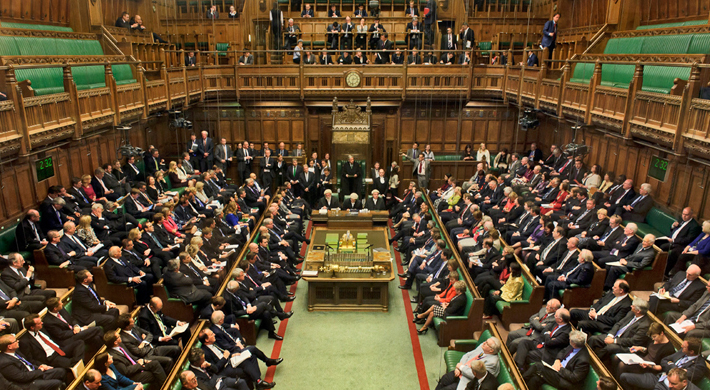
In Canada, a law prescribes fixed Parliamentary terms. For reasons outlined many times, it is more symbolic than it is binding. The only real penalty for ”œbreaking” the law is public disapproval should the electorate care enough about an arcane piece of legislation that never removed the Crown’s prerogative anyway.
However, in the UK, where the uncodified constitution makes constitutional amendment easier, Parliament bound itself to very fixed election dates. The Fixed Term Parliaments Act removed the Royal prerogative to dissolve Parliament, and placed it firmly in the hands of MPs.
It’s worth reading the (very short) Act itself. There are now only two ways a general election can be triggered.
One – if a motion of no confidence is passed in the House (the act even specifies the exact wording of that motion), and within 14 days, no new government is formed. If a new government is formed, it must immediately face an affirmative confidence test.
Two – if two thirds of the House passes a motion to call an early election.
Much of the commentary around post-election scenarios has been woefully ignorant of the enormous impact of the FTPA. Ironically, the person who has most grasped the potential and pitfalls of this Westminster Act is Scottish National Party leader Nicola Sturgeon.
- The post-election scenario of Supply and Confidence is null and void. This is where, in exchange for certain policy or legislative proposals, a smaller party supports a minority government on any motion that could lead to its fall. In the past, this would have meant money bills. But the FTPA makes clear that budget bills, estimates, and ways and means motions are no longer considered confidence.
- With a supply bill no longer a test of confidence, and a straight-up confidence vote so rare, there’s little incentive for a minority government to concede on policy or legislative issues in advance. They may as well just take it as it comes, and do deals should the need arise.
- With Supply and Confidence off the table, parties can either attempt to form a coalition, or test the confidence of the House alone. A coalition is a formal arrangement where two or more parties act in government, to pass pre-agreed policies and laws. As the polls stand, the needed coalition partner for either of the expected larger parties (Conservative and Labour) is the SNP. The SNP has ruled out a coalition with the Conservatives, who aren’t popular in Scotland. And after bogeyman fears about separatists, Labour has ruled out a coalition with the SNP. Time will tell as to whether these promises hold, but the numbers currently show that any government must contain either Labour or Conservatives, plus the SNP.
- If a coalition is out (based on current polling), and Supply and Confidence is pointless given the FTPA, you’re left with a minority government. And this is where understanding how governments are formed is crucial. Because the party that gets to test the confidence of the House first, gets to govern until they can no longer hold that confidence.
- Unlike some European countries, it is NOT the right of the largest party to try to govern first. The current government is still entitled to govern while they still may have the confidence of the House. Any lack of clarity around this question is ultimately resolved by the House.
- This post makes the crucial point that the Prime Minister has to resign first, upon discovering that a majority is impossible, before another party can test the confidence of the House. And even if downed by a confidence vote, the government still has 14 days to cobble together another formation with the required numbers.
- Even if Labour gets more seats, but not a majority, if Cameron thinks he has the numbers, or has a strong enough stomach to play chicken, he could continue to govern as a minority for quite a while before facing any sort of confidence test. Should he fail to pass a Queen’s Speech, he may choose to resign, but is not required to do so.
- The FTPA will not just impact government-forming. It will also alter governing, primarily because supply bills are no longer confidence tests. This means opposition parties can amend and even vote down money bills without triggering an election. This could leave a government that has the confidence of the House but cannot spend money or pass legislation. The government in this case may choose to call other parties’ bluff and present its own confidence motion to break the gridlock.
- Speaking of gridlock, in a case-by-case, multi-party Parliament, everyone fears an Italian-style debacle. Every bill requires endless negotiations for days, involving eight different parties, and plenty of horse-trading and backroom deals. An election is the so-called ”˜nuclear option’ (although political parties shouldn’t see citizens’ ultimate exercise of their democratic rights as a negative to be avoided). The FTPA potentially complicates this even further. The balance of power in any Parliamentary negotiation shifts, as smaller parties know they can eek out concessions and bring Parliament to gridlock, without triggering an election.
- While seemingly transferring some executive power to Parliament, the FTPA has actually entrenched executive power and made it harder for Parliament to topple the government
Further reading:
https://colinrtalbot.wordpress.com/2015/04/26/who-governs-britain-after-may-7th/
https://blog.policy.manchester.ac.uk/posts/2015/04/could-the-snp-block-a-labour-budget-no/
Photo by UK Parliament / CC BY-NC 2.0 / modified from original







